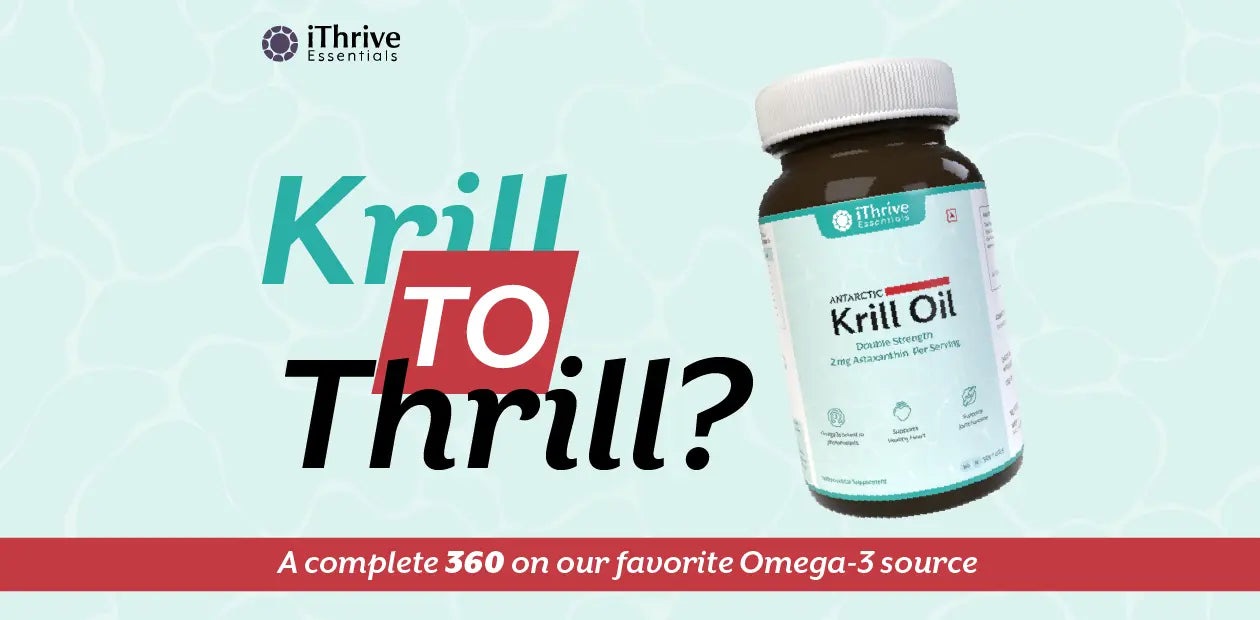
Why is Vitamin B-complex an essential supplement?
Your body needs B vitamins to survive. No, we are not being dramatic but they actually play an integral part in almost every biochemical process of your body like energy production, red blood cell regeneration, digestion, heart health and more.
However, being water soluble, this group of vitamins do not stay in the body for long and thus need to be replenished regularly. Though they are naturally present in the food you eat, looking at the diets today you might not be able to reach the optimal intake with just food.
This is why many recommend supplementing vitamin B Complex daily. In this blog, we’ll talk about how each vitamin present in our B complex supplement helps your body.
Vitamin B Complex is composed of eight B Vitamins - B1, B2, B3, B5, B6, B7, B9 and B12. Although each of these vitamins have their own significant uses and one of their major roles is digestion and production of energy. The entire group of B vitamins is used to breakdown carbohydrates, fats and proteins, convert them into nutrients and ATP i.e. energy.
Vitamin B1 (Thiamin)
The role of Thiamin, like all B vitamins, is to extract energy from food. Your body’s enzymes use vitamin B1 molecules to breakdown carbohydrates and amino acids consumed from food. Thiamine has other major roles as a coenzyme in the functioning of our central nervous system, producing energy, metabolic processes (namely amino acid, lipid and glucose metabolism) and also in the manufacturing of Deoxyribonucleic acid (DNA), fatty acids and Ribonucleic acid (RNA).
The most common result of Thiamine deficiency is the disease Beriberi. The symptoms of B1 deficiency are weakness, shortness of breath, impaired reflexes, numbness, and in extreme cases it can also cause seizures and paralysis.
Vitamin B2 (Riboflavin)
Riboflavin is the reason your urine is yellow in color, due to the presence of yellow-green fluorescent pigment in them. One of Riboflavin’s major roles is to help digestive enzymes convert food into energy.
Other than this, it’s an important component in the production of antioxidants (glutathione) which helps you get rid of free radicals which damage cell membranes and other structures. It helps in other ways like keeping blood cells healthy, contributing to eye and skin health, facilitating metabolic processes.
You must note that other B vitamins (like vitamin B6 and folic acid) need the support of vitamin B2 to function optimally.
Having vitamin B2 deficiency in itself is pretty rare. It is usually linked to other vitamin B deficiencies. People who tend to consume alcohol regularly, follow vegan diets (no meat or dairy) or are anorexic are more likely to have B2 deficiency. Symptoms of Riboflavin deficiency are cracked and swollen lips, sore throat, fatigue, blurred vision and liver degeneration to name a few.
Vitamin B3 (Niacin)
Many doctors have been known to prescribe vitamin B3 instead of many drugs. It has also been prescribed to people with high cholesterol and heart disease risk.
Niacin is used as a coenzyme for over 400 reactions taking place in your body. One of its forms ‘nicotinamide adenine dinucleotide (NAD)’, is used for intercommunication between cells, maintenance of genes and gene expression. Its other form ‘nicotinamide adenine dinucleotide phosphate (NADP)’ is used in the antioxidant system and production of cholesterol.
Deficiency of vitamin B3 can cause your skin to have rough texture with a prominent brownish discoloration. It can also cause diarrhea or constipation, headaches, vomiting, fatigue and apathetic feelings. In extreme cases, it can also lead to depression, memory loss, hallucinations and severe paranoia.
Vitamin B5 (Pantothenic Acids)
B5 is mainly available in the form of Coenzyme A (CoA), whose primary role is fatty acid synthesis and oxidation. Other functions of B5 are — helping create hemoglobin, producing stress and sex related hormones (like cortisol), maintaining a healthy nervous system, producing cholesterol, helping prevent nerve damage and more.
Due to its availability in almost all dietary components vitamin B5 deficiency is very rare. It is usually only seen in extreme cases of malnutrition. Its deficiency occurs together with other deficiencies or if someone is taking medication that blocks absorption of pantothenic acid.
Vitamin B5 deficiency symptoms are numbness, fatigue, irritability, headache, insomnia, stomach ache and muscle cramps.
Vitamin B6 (Pyridoxine)
Vitamin B6 comprises a group of six related compounds and is used extensively by your body in daily physical to mental functions. As the most recently discovered vitamin, its range of benefits keep increasing. One of vitamin B6 derivatives, PLP (pyridoxal 5’-phosphate), helps in the production of neurotransmitters.
Essentially, vitamin B6 is involved in over 100 enzyme reactions. It is crucial in fetal brain development and is an important nutrient in an infant's growth. It also helps maintain proper levels of homocysteine, is a natural painkiller and a mood enhancer.
Many people have been reported to be deficient in vitamin B6. It is one of the most common nutrient deficiencies. Vitamin B6 deficiency also occurs concurrently with other vitamin B deficiencies such as folic acid and vitamin B12. The symptoms include scaling of lips, weakened immune system, autoimmune diseases, swollen tongue, and anemia.
Vitamin B7 (Biotin)
Biotin is used as a cofactor in the body to support the activities of enzymes involved in fatty acid synthesis, gluconeogenesis (the generation of glucose from non-carbohydrate sources) and amino acid breakdown.
Usually, enough biotin is absorbed by your body if you have a well-balanced diet. In cases where biotin deficiency is observed, the subject may have a metabolic disorder, may be pregnant or lactating, may eat too many egg whites, parenteral nutrition or babies being fed formulas lacking in biotin.
Biotin deficiency can cause alopecia (hair loss), red and scaling rash around eyes, nose and mouth, seizures, numbness and tingling in extremities, skin infections, reduction in mental capacity to name a few.
Vitamin B9 (Folate)
Folate lies at the centre of many bodily functions including brain development and function, nucleic acid and amino acid metabolism, DNA and RNA synthesis and more. Its role in many methylation reactions also suggests folate is important for helping prevent certain cancers, cardiovascular disease and Alzheimer's disease.
It is highly recommended for pregnant women to either consume folate rich foods or supplement with B9 as they are more prone to folate deficiency. Lacking this vitamin, the fetus can develop spinal, mental and other deformities.
Vitamin B12 (Cobalamin)
This is another nutrient vital for almost all body functions. It plays an important role in DNA production, red blood cells, metabolism and defense of the brain system. Its most unique characteristic is that it is synthesized only by bacteria, archaea, and the human microbiome. It is rarely ever obtained from plants, that is why most Indians have a vitamin B12 deficiency. Low B12 can also lead to high homocysteine, which is an amino acid responsible for cellular metabolism and protein synthesis.
This prevalent nutrient deficiency is one of the main causes for fatigue. Other symptoms include concentration issues, numbness and tingling, depression, weakness, cognitive issues, pale skin, shortness of breath, etc.
By now you must have understood the importance of every B vitamin in the body! Vegetarians and vegans are more likely to have vitamin B deficiency. However, meat eaters have also been found to have vitamin B deficiency. Thus, you can get your vitamin B levels checked and accordingly supplement and eat the right foods to maintain optimal levels.
Why iThrive Vitamin B Complex?
As mentioned above, you require B vitamins every day as nearly every biochemical process in your body is in some way dependent on B vitamins.
What makes iThrive’s vitamin B complex the best option is that not only is our formulation the purest and most potent, but also in addition to the 8 essential B vitamins, we have added a bioavailable form of choline (Phosphatidylcholine derived from Non-GMO sunflower lecithin) and inositol. This supports liver, gall bladder & brain health. It also supports healthy fetal development during pregnancy, helps you fight insulin resistance & PCOS.
Benefits of iThrive Essentials B Complex are:
- Boosts energy levels
- Enhances mood
- Aids in stress management
- Supports a healthy nervous system
- Promotes blood formation
- Improves cognitive function
- Helps your body use carbohydrates for energy and aids in breaking down fats and proteins to support overall health and vitality.
- Supports red blood cell production
- Assists in maintaining healthy liver function and metabolism
- Supports neurotransmitter production
References:
- Arora, N., & Dave, S. (2023, January 3). Thiamine - Symptoms & Treatment for Thiamine Deficiency. https://www.ithrivein.com/blog/thiamine-symptoms-treatment-for-thiamine-deficiency
- Vitamin B1 (Thiamin) 101: RDA, Testing, and Supplementing. (2023, November 8). Rupa Health. https://www.rupahealth.com/post/vitamin-b1s-thiamin-role-in-the-body
- Henriques, B. J., Olsen, R. K. J., Bross, P., & Gomes, C. M. (2010). Emerging Roles for Riboflavin in Functional Rescue of Mitochondrial β-Oxidation Flavoenzymes. Current Medicinal Chemistry, 17(32), 3842–3854. https://doi.org/10.2174/092986710793205462
- Vitamin B2 (Riboflavin) 101: RDA, Testing, and Supplementing. (2023, November 8). Rupa Health. https://www.rupahealth.com/post/vitamin-b2-riboflavin-101-rda-testing-and-supplementing
- Vitamin B2 (Riboflavin) benefits, Foods, Supplements, Dosage - Dr. Axe. (2024, February 19). Dr. Axe. https://draxe.com/nutrition/vitamin-b2/
- Mahabadi, N., Bhusal, A., & Banks, S. W. (2023, July 17). Riboflavin deficiency. StatPearls - NCBI Bookshelf. https://www.ncbi.nlm.nih.gov/books/NBK470460/#:~:text=Riboflavin%20deficiency%20can%20cause%20fatigue,occur%20along%20with%20reproductive%20issues
- Top 15 niacin foods and their health benefits - Dr. Axe. (2023, December 21). Dr. Axe. https://draxe.com/nutrition/niacin-foods/
- How to make sure your patients are getting enough vitamin B3 (Niacin) in their diet: testing, RDAs, and supplementing. (2024, January 4). Rupa Health. https://www.rupahealth.com/post/vitamin-b3-niacin-101-testing-rdas-and-supplementing
- Office of Dietary Supplements - Pantothenic acid. (n.d.). https://ods.od.nih.gov/factsheets/PantothenicAcid-HealthProfessional/
- Vitamin B5’s (Pantothenic Acid’s) 101: RDA’s, Testing, nutrition. (2023, November 8). Rupa Health. https://www.rupahealth.com/post/vitamin-b5s-pantothenic-acids-role-in-the-body
- Pantothenic acid (Vitamin B5) Benefits, deficiency and foods - Dr. Axe. (2023, September 11). Dr. Axe. https://draxe.com/nutrition/vitamin-b5/
- Team, T. A. (2023, October 26). Benefits of almond oil for hair. https://www.tataaig.com/knowledge-center/health-insurance/vitamin-b5-rich-foods
- Vitamin B6 101. (2024b, February 12). Rupa Health. https://www.rupahealth.com/post/vitamin-b6-101-testing-nutrition-and-supplements
- Vitamin B6 Benefits, uses, deficiency, dosage and more - Dr. Axe. (2023, November 13). Dr. Axe. https://draxe.com/nutrition/vitamin-b6-benefits/
- Office of Dietary Supplements - Vitamin B6. (n.d.). https://ods.od.nih.gov/factsheets/VitaminB6-HealthProfessional/
- Brown, M. J., Ameer, M. A., Daley, S. F., & Beier, K. (2023, August 8). Vitamin B6 deficiency. StatPearls - NCBI Bookshelf. https://www.ncbi.nlm.nih.gov/books/NBK470579/#:~:text=As%20a%20coenzyme%2C%20vitamin%20B6,anemia%2C%20rashes%2C%20and%20glossitis
- Saleem, F., & Soos, M. P. (2023, February 20). Biotin deficiency. StatPearls - NCBI Bookshelf. https://www.ncbi.nlm.nih.gov/books/NBK547751/



Leave a comment
This site is protected by hCaptcha and the hCaptcha Privacy Policy and Terms of Service apply.